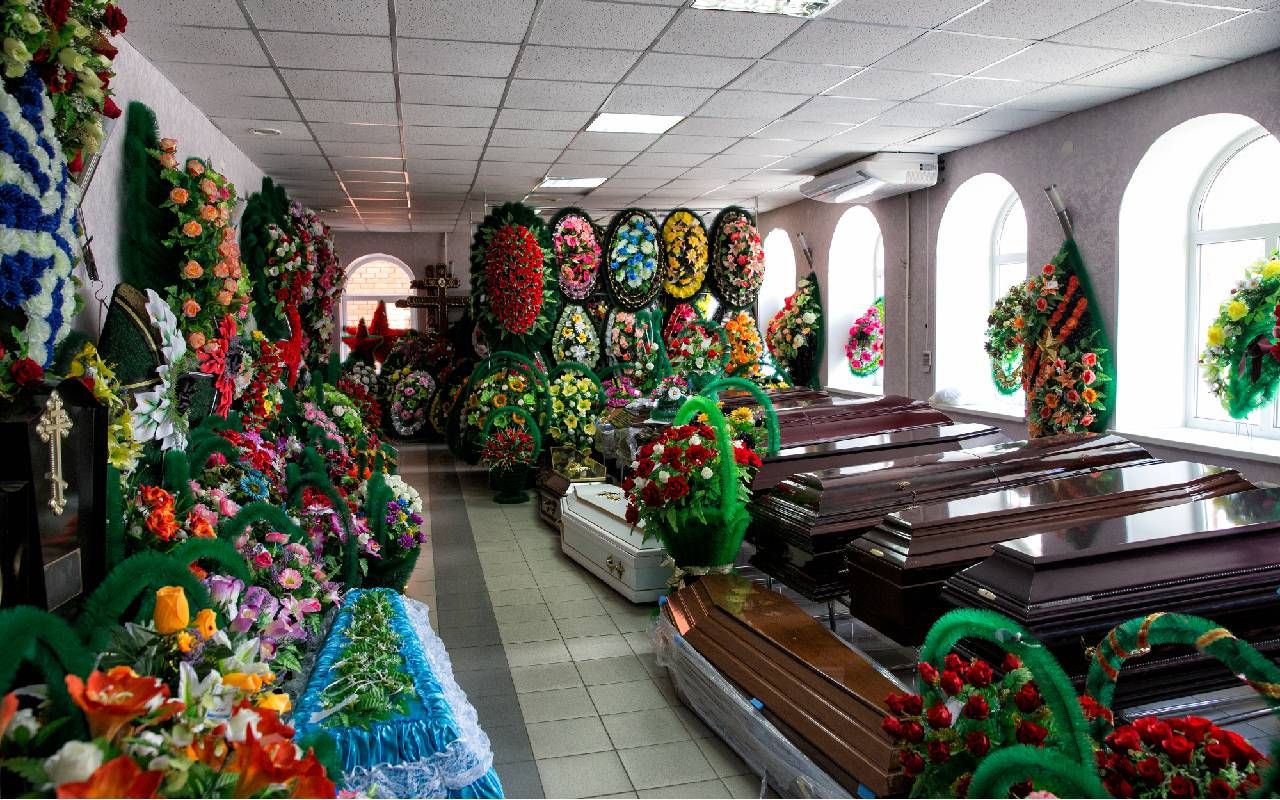Putting My Affairs in Order
Acquiring a coffin and disposing of possessions in anticipation of the inevitable
"What kind of coffin do you want?" the funeral director asked.

Phone to my ear, I tried to think quickly. "I'm not sure. Can I look at them when I come in tomorrow to sign?"
"You want the same one your mother had?"
"Do you still have it?" My mother had pre-paid her funeral in 2005 and died in 2009. I was pre-paying mine in 2024.
"We do. Number 344, polished oak."
Shopping for Eternity
It shouldn't have surprised me. Coffins weren't like cars, with new models every year.
When my mother went through this process, she was 91 and in tying-up-loose-ends mode; she was not nearly as sharp as she'd been in her formidable years as an elementary school principal, but her administrative side was still strong. She liked being in charge of her life, though lately she was relying on me for tasks like paying bills.
"This is better, but it doesn't look very comfortable. Is there anything softer? Maybe with a pillow?"
She and I had been in the office of the Plaza Jewish Community Chapel on Amsterdam Avenue in Manhattan, the same chapel I was on the phone with now. The questions had been similar. What is your Social Security number? How many death certificates do you want? Then came the coffin question.
"Nothing fancy," my mother had said. "Just a plain wooden box."
"Can I see what it looks like?" I asked.
Like a Cemetery, Only More Lifeless
"Sure. The showroom is on the lower level." The director rose.
"Mom, do you want to come?"
"You go. I'll wait here."
Downstairs, we entered a room that looked like a miniature cemetery — orderly rows of coffins in varying shades of brown and gray — except it was more lifeless. No sky above our heads or grass beneath our feet. No gentle hum of insects.
"This is the plain pine coffin," the director said, stopping in the middle of a row.
It was, indeed, very plain compared to those with varnished tops. I touched it. "I can't put my mother in this," I said. "She'll get a splinter. Do you have anything with fabric?"
He showed me one lined with fabric, but there was no cushioning.
Trying on a Coffin
"This is better, but it doesn't look very comfortable. Is there anything softer?" I asked. "Maybe with a pillow?"
After a few more upgrades, I liked what I saw. "Can I lie down and see how it feels?"
His face flashed surprise before he said smoothly, "No one ever asked me that, but sure, if you want to."
I took off my shoes, stepped in, and lay down. It was certainly soft, but there was literally no wiggle room. I couldn't have turned over if I'd wanted to. I closed my eyes, visualizing the lid closed and suddenly felt unbearably claustrophobic. I was up in seconds.
"Thanks," I said, putting on my shoes. "This one's fine."
Upstairs, I told my mother I picked out something fancier than a plain box, and also over $1,000 more. "Do you want to see it?"
"Whatever you decided is OK."
"All right," I said to the funeral director now. "I'll take what my mother had."
What to Wear to Your Own Funeral
"Got it. Only a few more questions," he said. "Would you like to be buried in a shroud or your clothes?"
I hadn't considered this detail. I wanted to look good. "In my clothes."
"OK. And do you want a graveside service, or one here in the chapel?"
From my experience going to funerals, I knew more people would come to a service in Manhattan than at a cemetery over an hour's drive away. I wanted a lot of people to attend. "In your chapel," I said. It was where my mother's service was.
I was never married and have no children, but I'm lucky to have a large and wonderful extended family.
After a few more questions, he gave me the total: $14,000. It covered everything, including six death certificates, payment to the rabbi, a tip for the hearse driver and the cemetery fee for opening the grave. I was to come in the next day and pay with a bank check.
Choosing the Executors
He would forward my application and check to PrePlan Funeral Trust in Albany, where a government-backed account would be set up, with me as the beneficiary. It would earn interest, which Plaza Jewish Community Chapel would receive, but I would be responsible for paying the taxes on it.
I considered this a fair arrangement. At 81, I might live another 20 years. The cost of my funeral could be a lot higher than $14,000.
I was never married and have no children, but I'm lucky to have a large and wonderful extended family. A nephew and one of my cousins are my co-executors. I'm grateful they agreed to do this and want to make it as easy as possible for them. Hence my decision to pre-plan and pre-pay my funeral. It's also the reason I am organizing my financial records and have gotten rid of extraneous stuff.
I got a forced head-start on decluttering a year ago, when I moved from an apartment in an Upper West Side brownstone, where I'd lived for 52 years, to an Upper East Side building for older adults. While I loved my previous apartment, I didn't know how much longer I would be able to carry groceries, laundry and other necessities up and down three flights of stairs.
Drastic Downsizing
With only two months' notice of my impending move, I had to downsize quickly and drastically. I'd be going from a one-bedroom to a studio and had too much of everything: furniture, blankets, coats, flower pots, handbags, suitcases and vases, not to mention three full-size filing cabinets filled with family history, early drafts of my memoir, income tax returns and old letters.
I had a TV set and a fax machine I no longer used, and boxes under my dining table of stuff I had retrieved when I cleaned out my mother's apartment and still hadn't gone through.
During those two months, I took inspiration from "The Gentle Art of Swedish Death Cleaning," a book laced with practicalities about how to make it easy for your relatives after you die and how to make sure they won't find anything embarrassing to either you or them. Probably the most oft-quoted of her advice is, "Save your favorite dildo — but throw away the other 15!"
I began scanning photos and documents, something I'd resisted previously because I'm from the era when hard copy was the gold standard.
Recycling the New York City Way
I made many trips to donate salable goods to the thrift shop at Housing Works, a New York City nonprofit, and several to Goodwill. I enlisted the services of Junkluggers. I invited relatives to my apartment for a rummage sale where everything was free. I recycled some things the New York City way — by leaving them on the sidewalk in front of my building and checking in a few hours to ascertain that they were gone.
If it were to be my own clothes, one of my relatives would have to come to wherever I was living, pick them out, and bring them to the funeral home ahead of time. That defeated the purpose of making it as easy as possible for them.
By the day of my phone conversation with the funeral director, I had been living in my studio for 11 months. It has good feng shui — everything I need, little I don't, with plants in window boxes and art on the walls. It is "ready" for my death and also functional enough to live in for another 20 years.
I lay in bed that night relieved to have started the funeral process but also unsettled — though not necessarily in a bad way. I tried to relax with the midnight refresh of Wordle in my New York Times games app, then thought again about what I wanted to be buried in.
A Hitch in the Plan
If it were to be my own clothes, one of my relatives would have to come to wherever I was living, pick them out, and bring them to the funeral home ahead of time. That defeated the purpose of making it as easy as possible for them. For the first time in months, I didn't finish Wordle.
The next day, sitting across from the director in his office at Plaza Jewish Community Chapel, I told him I changed my mind. I wanted to be buried in a shroud.
He made a notation on the paperwork. "I quoted you $14,000, and I'm not going to change that," he said. "I won't charge you for the shroud."
"Thank you," I said. Then a thought occurred to me. "Does the shroud cover your head?"
"Yes."
"I don't want my head covered." Too suffocating.
"I'll make a notation not to use the head covering."
A Burden Lifted
The application was several pages long. I looked it over, signed where he indicated, and gave him a bank check.
"You'll hear from Pre-Plan within a week. They'll set up the trust and let you know your account number. You can keep track of it online, like a regular bank account." We shook hands.
As I walked out into the sunshine on Amsterdam Avenue, I was surprised at how light I felt, like a kite floating on the wind. I wanted to shout to the world, "I made arrangements! I don't have to worry if I die! Everything is taken care of!"
Instead, I walked the few blocks to Trader Joe's, where, as an older adult, I'm entitled to go to the head of the checkout line. I was out in five minutes, with my celebratory box of mochi-covered vanilla ice cream. I began eating the refreshing dumplings on my walk home through Central Park and finished them all before I was halfway there.
Pre-Paid Peace of Mind
The next day, I looked at the paperwork more closely and was dismayed to see my name listed as Vivian Cohen, not Vivian Conan. It could be fixed, I knew, yet I felt a sense of urgency. What if I died before it was straightened out? But within a few days, I was safely Vivian Conan again, able to access my account online, print it and mail the information to my nephew and cousin.
In the month since I made my funeral arrangements, the glow has continued, like a background feeling that all is secure. I realize I did this as much for myself as for my nephew and cousin. I have long been wondering when and how I will die.
Pre-paying didn't give me answers, but it did give me some sense of control, as did downsizing and moving. Partial control is better than no control. It's enough to leave me with more energy to continue living my life and doing what I love: working part-time as a reference librarian, singing in a choir, folk dancing, taking writing workshops, visiting my many cousins, nieces and nephews, and going out with friends.
When my time does finally come, I will be able to say, to paraphrase my favorite poet: Because I could not stop for death, he kindly stopped for me. I did not expect him quite so soon, but I am ready. My papers and my house are in order.


